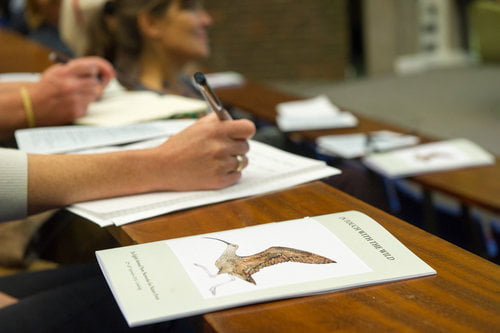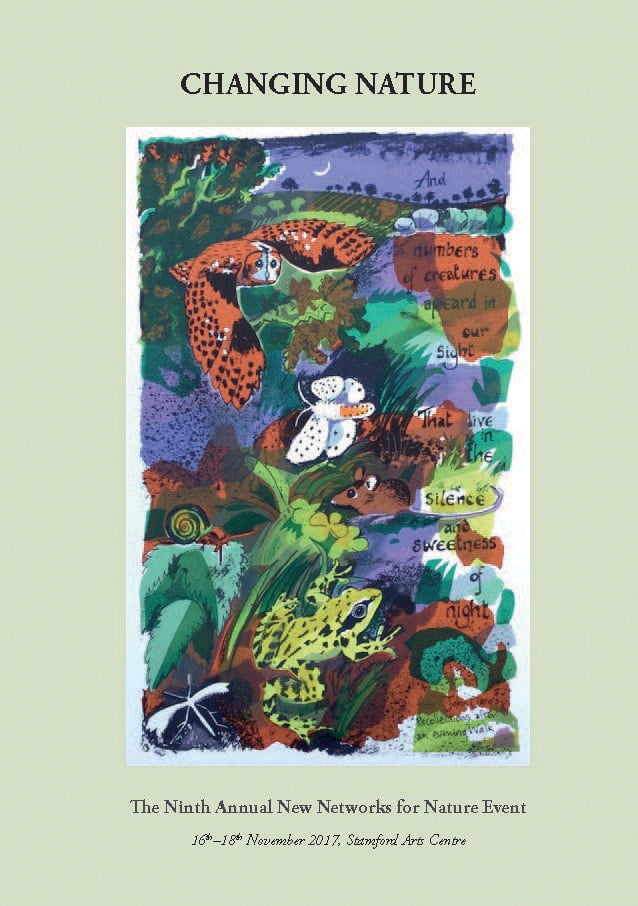‘NATURE MATTERS: CHANGING NATURE’ CONFERENCE
16-18 November 2017, Stamford Arts Centre, Lincolnshire
I was surprised that, apart from Richard Kerridge who is a member of the Steering Group, I seemed to be the only ecocritic there. It seems that the annual conference of New Networks for Nature has been a treat unknown to ecocritics, but not to nature writers, naturalists, film-makers, photographers, artists, conservationists, musicians and students.
Four things struck me at my first visit to this remarkable event. Firstly, it was full of surprises which the programme barely hinted at. Friday, for example, began with a palaeontologist explaining ‘normal’ extinction rates (20 species a year) in deep time compared to the current 30,000 a year. It ended with a ‘Friday finale with Sam Lee’ who, it turned out, sang with nightingales in Sussex and sent us out into the night with a tune in our heads (‘And the larks they sang melodious …’). The senior scientific ornithologist Ian Newton, whose book Farming and Birds is the latest in the New Naturalist series, led a panel discussion with actual farmers and a rural policy advisor that produced lively and challenging questions from a knowledgeable audience. Then here was Mike Edwards with his four digeridoos showing us how, for him, this was ‘the sound of country’ in a passionate speech and a prodigious performance.
Secondly, the sheer quality of the presentations from every speaker and panel member was impressive.
Not only was each of them at the top of their game, notable in their field, but they all seemed to be superlative communicators who had taken a lot of care in selecting their material. Fifteen year old British Bangladeshi birder Myra-Rose Craig (‘Birdgirl’ blogger), who runs summer camps on the Levels in Somerset to get Black and Asian kids interested in nature, is an accomplished and experienced presenter already. And how often can you say that every speaker kept to time? Which indicates my third observation – the sheer professionalism of the event. Knowledgeable enthusiasts can be hard to control, but from the very first conversation, expertly chaired by Mary Colwell (see her very readable biography of John Muir), between the Eden Project’s Tim Smit and The Guardian’s Patrick Barkham, it was clear that a balance between provocation and professionalism had been given some thought by the organisers.

On arrival each attendee was given a superbly produced booklet of new writing and artwork on the theme of ‘Changing Nature’ by some presenters (found metal sculptor Harriet Mead on making the image on the facing page), some audience members (Stephen Moss on species gains and losses from climate change) and absent friends (Paul Evans, Judith Tucker and Harriet Tarlo). This booklet alone was worth the entrance fee as a resource for ecocritics. Philip Hoare’s moving writing about his encounter with a dead dolphin sent me back to his Leviathan (2009) and RISINGTIDEFALLINGSTAR (2017). The words ‘She echo located me’ sit in my notebook from his talk, a casual reference to a previous talk about swimming with a whale. Such levels of experience, expertise and professionalism were nothing less than mind expanding.
Finally, this really is a network. It’s not just that people talk to each other; they are genuinely interested in each other’s work, in whatever medium.
So presenters do not just do their thing and quietly slip away – they stay because they’re interested in this remarkable gathering. They ask questions of each other and readily introduce you to someone you ought also to be talking to and didn’t realise it. For example, I was glad to meet (non-presenting) Mark Cocker for the first time and I bought a lithograph as a Christmas present from artist Carry Akroyd. Unexpectedly I found out two things about Ted Hughes that I didn’t know, from casual conversations over coffee with different people with interests – one fishing and one conservation – in Devon’s rivers.
The academic demand for the production of conference papers and their publication might be a reason why the ubiquitous Kerridge and my retired self were the only ecocritics present. If this is so, it should give us pause. Funding might also be an issue. But as a pensionista without institutional funding for such things I have realised how much the negative institutional attitude to such an inspirational gathering deprives academics of much fun, widening knowledge and fundamental thinking about the whole of nature and its mediation. The next NNN conference will be at Stamford Arts Centre 15-17 November 2018.

